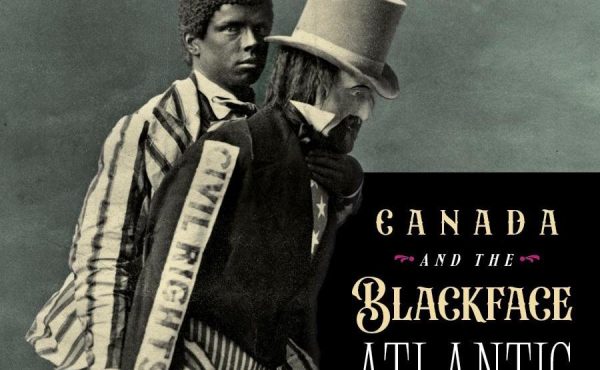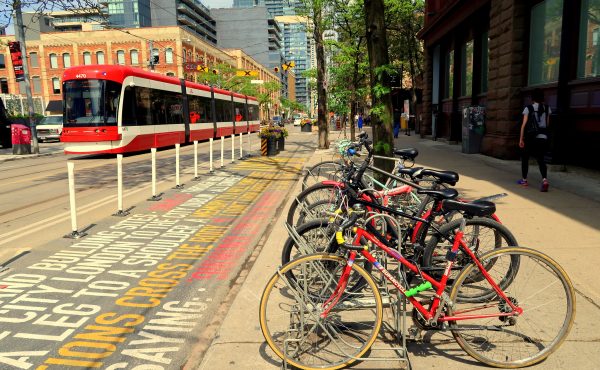
“Going to School: A Transit Conference for the GTHA” took place last week at York University in front of a crowd of more than 150 transit professionals, advocates, and interested students. It featured four discussion panels on transit issues facing the GTHA’s 500,000 post-secondary school students. The thought-provoking conference covered a range of topics from the need for more interconnectivity between post-secondary institutions to better land use planning for transit oriented campuses.
Deanne Fisher, OCAD University’s Associate Vice-President of Students was featured in the opening Presidents panel along with six other heads of the region’s universities and colleges. Spacing caught up with her for a post-panel talk.
Spacing: There was much discussion about waiting for larger transit projects to be completed. What is OCAD doing now to improve transit problems at your school?
Fisher: Our students often take more than one regional transit system, GO plus TTC. It’s hard to complain too much because we’re fairly well served and we recognized that were quite privileged. But in terms of volume on the TTC if you can imagine being a student who has to carry a painting, a sculpture, an art project or an architectural design on crowded subway you can imagine how difficult that might be. So I guess our immediate interests would be in improved student service, students tend to travel off peak which is the nice thing about students is that they’re not necessarily 9-5ers. Our immediate interests would be in Wi-Fi access on transit would help our students immensely. Because then that time spent on the GO train or TTC if you happen to get a seat would actually be used in a productive manner. You know short term, were just looking at making it a more civilized experience for out students.
Spacing: You talked about how a large amount of your students come from outside the GTA—and they’re all being directed towards Union Station. How would you improve that transition from different transit lines?
Fisher: I would say for the most part, and I don’t have an explicit map, but I looked before I came here and 50% of our students don’t have a postal code that begins with an M which means they’re outside the GTA. They’re in other areas of the GTA. And we know for example last year when the York Region Transit had a strike, lots of our students were affected by that. And you tend to think oh well that doesn’t affect us we’re tiny OCAD in the middle of downtown Toronto, but in fact hundreds of our students were affected by York Region Transit strike. It’s really about figuring out how many and where students are coming and making that transition between transit systems seamless and civilized so you can move from one system to another.
Spacing: How would you want those stations where there is a high volume of traffic become safer or more seamless for students to take?
Fisher: One of the things would Fare systems, F-A-R-E not F-A-I-R, for students. A lot of students do a mental calculation, so TTC for example works on a monthly metro pass for students, but a lot of students don’t go five days a week. They’ll actually schedule and compact their classes in three or four days and have a day at home. And then they’ll do the math and well the monthly pass doesn’t make a difference for me. Where as GO transit has always been terrific in offering a student discount. TTC recently introduced it in the last few years, its not a tremendous discount, but every little bit helps. I think students would be looking for some kind of fare system that’s integrated, where you can use the same card and something that doesn’t make you buy a year long or a monthly pass. But that recognizes whatever point you are in the system you’re generally living below the poverty line for a period of time.
Spacing: If Toronto is going to improve transit and make transit better for students, where should the funding come from?
Fisher: My personal opinion would be that some form of taxation that was directly attributable to public transit is something I would be in favor of. Even as an urbanite downtowner who rides a bike every day, and actually very rarely even ride the subway because it’s too crowded for me to get on it. I would still support that as a means to make it a more livable city and also reduce congestion and improving air quality. And I don’t know the ins and outs of using a sales tax, it seems to me a strange instrument to use and it’s politically very difficult to figure out if it can be done, but some kind of taxation, either an employer tax or something like that would seem to me the most viable mechanism. That seems to make the most sense. Universities are facing their own challenges, so were never going to be able to say here take our money, but there’s got to be some taxation mechanism that Torontonians would support.


